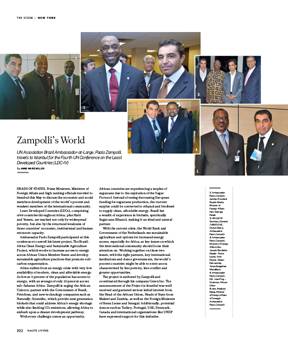Instead of seeing decreasing European funding for sugarcane production, the current surplus could be converted to ethanol and biodiesel to supply clean, affordable energy.
Heads of States, Prime Ministers, Ministers of Foreign Affairs and high ranking officials traveled to Istanbul this May to discuss the economic and social members development of the world’s poorest and weakest members of the international community.
Least Developed Countries (LDCs), comprising of48 countries throughout Africa, plus Haiti and Yemen, are marked not only by widespread poverty, but also by the structural weakness of those countries’ economic, institutional and human resources capacity.
Ambassador Paolo Zampolli participated at this conference to unveil his latest project, The Brazil-Africa Clean Energy and Sustainable Agriculture Project, which works to increase access to energy across African Union Member States and develop sustainable agriculture practices that promote soil-carbon sequestration.
Africa suffers from an energy crisis with very low availability of modern, clean and affordable energy. As low as 5 percent of the population has access to energy, with an average of only 20 percent across sub-Saharan Africa. Zampolli is urging the African Union to partner with the Government of Brazil, Petrobras, and new technology companies such as Naturally-Scientific, which provide next generation biofuels that could address Africa’s energy shortage while also limiting CO2 emissions, allowing Africa to embark upon a cleaner development pathway.
With every challenge comes an opportunity. African countries are experiencing a surplus of sugarcane due to the expiration of the Sugar Protocol. Instead of seeing decreasing European funding for sugarcane production, the current surplus could be converted to ethanol and biodiesel to supply clean, affordable energy. Brazil has a wealth of experience in biofuels, specifically Sugarcane Ethanol, making it an ideal and natural partner.
With the current crisis, the World Bank and Government of the Netherlands see sustainable agriculture and options for increased energy access, especially for Africa, as key issues on which the international community should focus their attention on. Working together on those two issues, with the right partners, key international institutions and donor governments, the world’s poorest countries might be able to enter an era characterized by less poverty, less conflict and greater opportunities.
The project is authored by Zampolli and coordinated through his company Green Inc. The announcement of the Project in Istanbul was well received and garnered serious initial interest from the Head of the African Union, Heads of State from Malawi and Zambia, as well as the Foreign Ministers of Sierra Leone and Senegal. Additionally, potential donors such as Turkey, Portugal, UAE, Denmark, Canada and international organizations like UNDP have expressed support for this initiative.





















